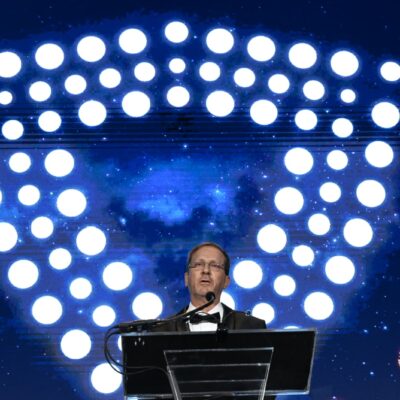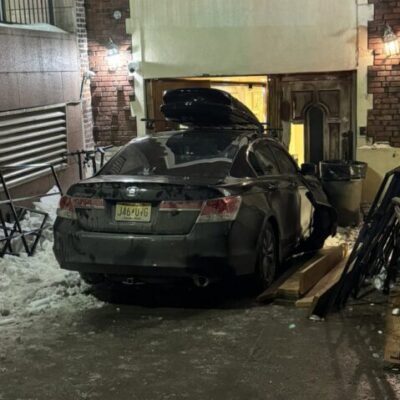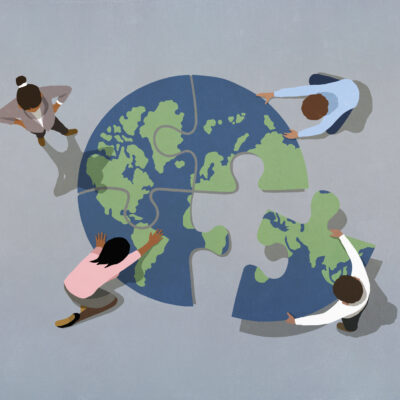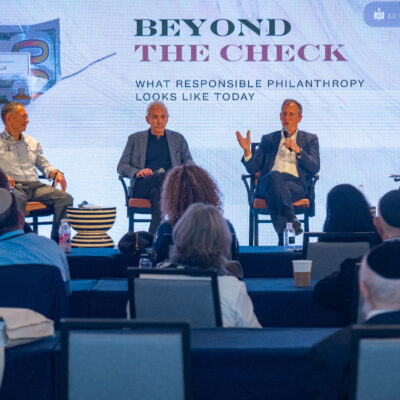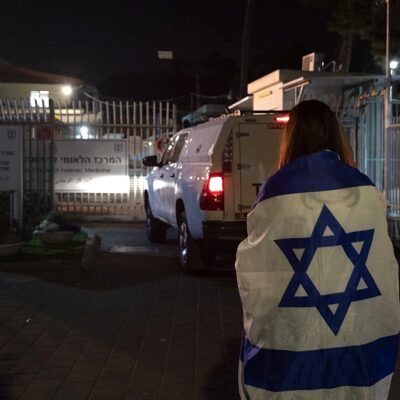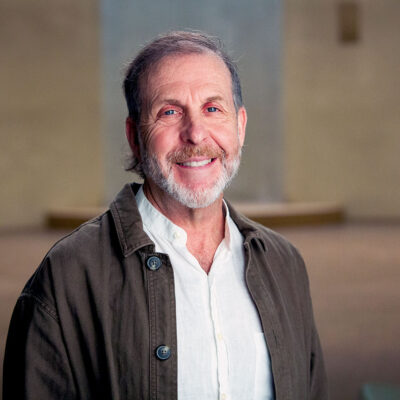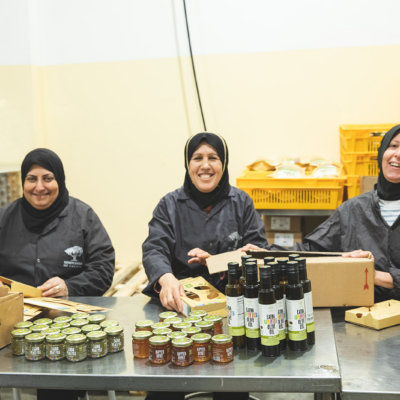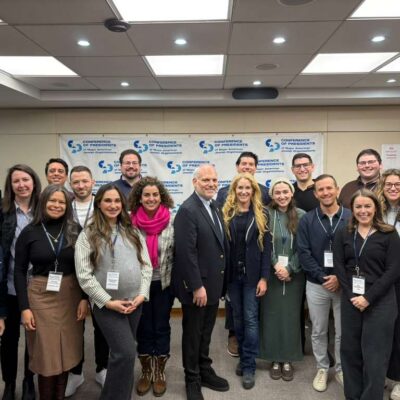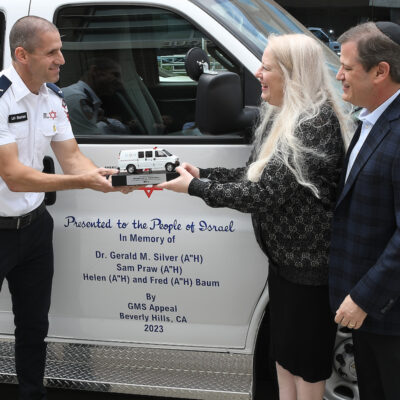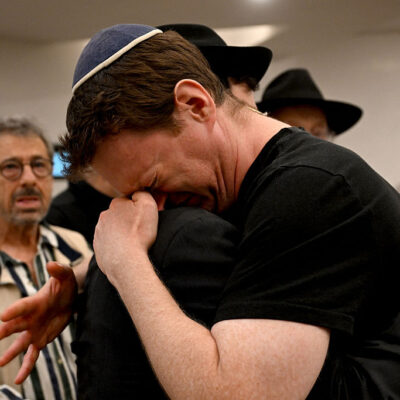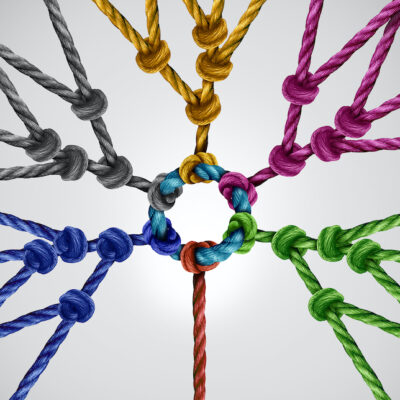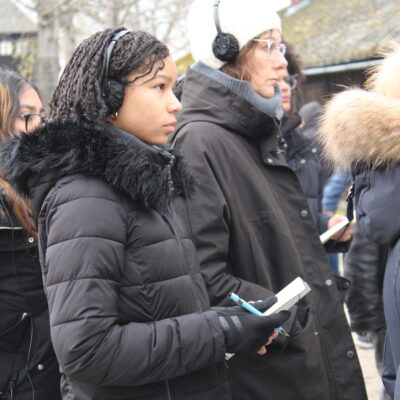WAR NO MORE
‘Believe things can change,’ Irish expert tells Israeli and Palestinian peace NGOs at Jerusalem summit
At Amal-Tikva’s annual meeting this week, peace-building groups reflect on the past year for the field, which brought major challenges and renewed interest, and consider the future

Courtesy/Dor Pazuelo
Participants speak at Amal-Tikva’s annual summit at the Feel Beit Israeli-Palestinian cultural center in Jerusalem on Feb. 4, 2025.
Irish conflict resolution expert Mari Fitzduff drew a straight line between her work on the 1998 Good Friday Agreement in Northern Ireland and the ongoing, deadly conflict between Israelis and Palestinians: Education — and perseverance — are the keys to bringing about change.
“We have to believe things can change,” Fitzduff said in her keynote presentation at a meeting of some 75 representatives of Israeli and Palestinian peace-building groups who gathered in Jerusalem at the Feel Beit Israeli-Palestinian cultural center for Amal-Tikva’s annual summit on Tuesday — a few hours before President Donald Trump proposed having the United States “take control” of the Gaza Strip and relocating the Palestinian inhabitants of the enclave.
“I can imagine how dark… it’s been over the past year… And I’ve met some people who really can’t live beyond it. These are people I know and love and who have believed [in peace-building] and are still finding it so hard to believe that there’s anywhere that this can go. But you know, we used to say: 24 hours crying and then up again, 24 hours crying, and then up again and again and again, and — oh my God — again. It’s tough.”
Fitzduff said she could understand what all the peace-builders in the group were feeling. She served as chief executive of the Northern Ireland Community Relations Council in Belfast, and director of UNU/Incore, a United Nations University center for conflict resolution and was instrumental in laying the groundwork for the Good Friday Agreement, which brought an end to decades of violence in Northern Ireland. Over 50% of the success of the Northern Ireland agreement was attributed to the work of civil society and NGOs, she said.
“I don’t believe, except for a few… that there are people who are evil or people who are good,” she said. “So remember, don’t ever lose faith that people will change.”

One of the foundations for the change that happened in Northern Ireland was education, she said, and that is a process that needs to happen before any true peace agreement can be reached. That is where the NGO peace-builders need to exert their important role, she said, as she pressed them to continue in their quest for a viable peace.
“We can get there; we can go ahead. Just keep it up,” Fitzduff said.
Amal-Tikva, a leading NGO in the peace-building field, which aims to build capacity for sustainable and scalable peace-building activities between Israelis and Palestinians, brought together 37 other leading NGOs from both communities to discuss the critical role of civil society in revitalizing peace efforts.
At a pivotal moment in the ongoing conflict, with signs of de-escalation emerging from the cease-fire between Israel and Gaza, questions about “what’s next?” highlight the need for a focused approach to peace-building between Israelis and Palestinians, according to the group. Amal-Tikva co-founder and CEO Meredith Rothbart emphasized that now is the crucial time for meaningful discussions about peace and noted that Amal-Tikva has developed a framework for how both sides can collaborate to achieve it despite the extremely complex times when everyone has been affected by Oct. 7 and the war.
“Personally it’s been extremely complicated. I have four children and my husband was called up on Oct. 7 and has served in the reserves for more than half of the last year,” she told eJewishPhilanthropy. “Every single one of us has been touched in different ways. And at the same time, we’ve seen increased interest from NGOs, higher-level, farther-reaching NGOs, donors that want to be engaged.”
Rabbi Hanan Schlesinger, the director of international relations of Roots, a Palestinian-Israeli initiative for understanding, non-violence and transformation, said that this year following Oct. 7 was the first time they saw an increase in donations.
“Literally people were throwing money at us, though that’s come to an end now, and we didn’t have a lot to do with the money. We focused on humanitarian work, but the cross-border work of dialogue and listening for about a year was just limited to our staff and activists,” he said. “So now we are going back to our constituency, our larger audience and involving them slowly. But we still are running on a surplus now. For the first time we have money in the bank.”
He said that as a religious peace-builder he has felt alienated from his own source of spirituality as he has seen Judaism being used as a “terrible force for destruction and polarization and violence.”
“It’s even more than painful, it is devastating,” he said. “And I’m not one of those people who say that I have the real Judaism, the peaceful Judaism, the authentic Judaism, and those violent people kidnapped Judaism in the wrong direction. No, religion is as religion does and what is Judaism today? Judaism is what you see, and I’m not part of that. [With Amal-Tikva] we each have a certain part and everyone has their own role. And together as a group, and an expanding group, perhaps we can make a difference.”

According to a survey conducted by Amal-Tikva, 70% of peace-building NGOs continued to operate their pre-Oct. 7 programs binationally following the outbreak of the war, and 85% of all programs continued to operate, 60% in person.
Rothbart noted that Amal-Tikva had 80 applicants for 16 spots for their emerging leaders program, and it is also launching a new Leadership Institute geared toward people who haven’t gone through a process of engaging with the other side and haven’t been engaged in the field and would like to now get involved in it professionally.
“That didn’t come out of our wish to do so, it came out of so many people turning to us who want to get involved,” Rothbart said. “So while the world out there is showing us that peace building isn’t an option, what we are actually feeling from the organizations, from the donors, from the activists is that there is. The world in general is seeing violence and it feels like actually people within themselves are saying: ‘OK, I guess we could just keep killing each other, but that’s not leading us to anything different.’ ”
Some of the participants at the conference, such as the Jerusalem Youth Chorus, were among the organizations affected by President Donald Trump’s order for a 90-day freeze on foreign aid pending a policy review, as The Middle East Partnership for Peace Act — the U.S. legislation responsible for providing $25o million over five years to support peacebuilding between Israelis and Palestinians — will likely be frozen.
A three-year $500,000 U.S. grant that the Jerusalem Youth Chorus was awarded is also now in peril, according to a representative of the organization who asked not to be named.
“We still don’t know where it’s going, but we know for now it’s stopped,” he said. He noted that following the Oct. 7 attacks, there was an increase in funding, primarily from donors abroad, which he credited to a growing awareness and support for peace initiatives during challenging times.
Indeed, he said, the children’s parents insisted that they continue meeting and last year was one of the choir’s biggest years as the group performed on America’s Got Talent, appeared on TED Talks and did two international tours.
Peace-building is not a matter of creating projects, noted Mohammed Hadieh, of ACT Conflict Resolution, but rather long-term implementation of activities that build on each other and have funding cut off in the middle of the process can be disastrous, he said.
“The peace-building issue is not a project, it’s something you are building and you don’t want to lose your partners, your beneficiaries, your goals, your strategies,” he said.
For the NGO representatives, the words of encouragement from Fitzduff — and the joining together with others working in the peace-building sphere for a day of reflection and sharing of experiences — provided much needed support and reassurance that they are not alone in the struggle.
“The constant day-to-day feeling for me in the past 15 months was a feeling of loneliness, because the way I see the reality is very much different from the mainstream point of view of my Israeli community, Israeli friends, family,” said Talia Vekshtein of the nonprofit Lissan, which teaches practical Hebrew to Palestinian women in East Jerusalem. She noted that the organization’s funding from the Jerusalem Municipality was cut off, but foreign donors continue being supportive. “Being here with people that share the same perspective and have the same vision and aspirations for the future is really strengthening. I see the ecosystem on a larger scale and I see how together we create a puzzle where the picture is more whole.”

 Add EJP on Google
Add EJP on Google


